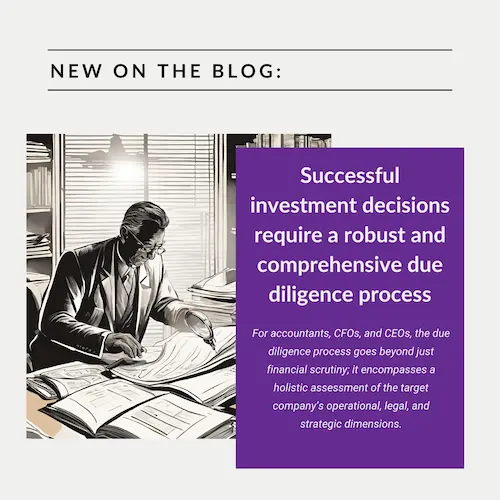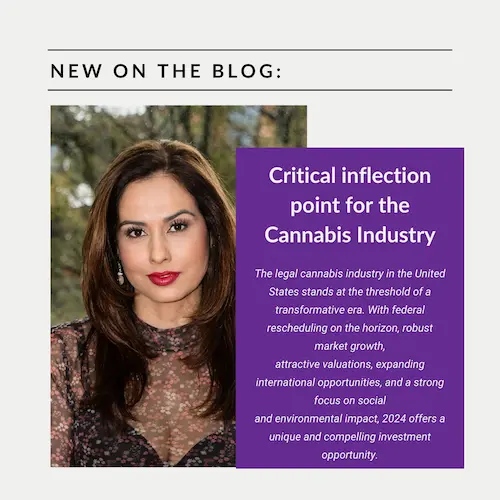Comprehensive Due Diligence for Successful Investments: A 10-Step Guide for Accountants, CFOs, and CEOs
Abstract
Investment decisions, especially in today’s complex and rapidly evolving markets, require rigorous due diligence to ensure the success and sustainability of capital deployment. For accountants, CFOs, and CEOs, the due diligence process goes beyond just financial scrutiny; it encompasses a holistic assessment of the target company’s operational, legal, and strategic dimensions. This article outlines ten critical due diligence steps that should be meticulously followed to optimize investment outcomes and minimize risks.
Key words: Due Diligence, Investment Analysis, Financial Statements, Profitability, Revenue Trends, Financial Ratios, Market Landscape, Competitive Positioning, Industry Trends, Management Team, Governance, Operational Efficiency, Scalability, Legal Compliance, Regulatory Risks, Intellectual Property (IP), Technology Assessment, Innovation, Customer Relationships, Supplier Relationships, Environmental, Social, and Governance (ESG) Factors, Valuation Methods, Deal Structure, Exit Strategy, Post-Investment Planning, Risk Management, Strategic Goals.
1. Thorough Financial Analysis: Evaluating Historical and Projected Performance
The foundation of any due diligence process is a comprehensive financial analysis. Investors must examine the target company’s historical financial statements—balance sheets, income statements, and cash flow statements—over at least the last three to five years. The objective is to assess profitability, revenue trends, cost management, and cash flow stability. Key financial ratios, such as the current ratio, debt-to-equity ratio, return on equity (ROE), and earnings before interest, taxes, depreciation, and amortization (EBITDA), should be scrutinized to evaluate financial health.
Projected financial performance is equally important. Investors should review the company’s financial forecasts, assessing the realism of assumptions related to market growth, cost control, and capital expenditure. Sensitivity analysis should be conducted to understand how changes in key variables could impact future performance.
2. Understanding the Market Landscape: Competitive Positioning and Industry Trends
A deep understanding of the market in which the target company operates is crucial. This involves analyzing industry trends, market size, growth potential, and the competitive landscape. Investors should identify the company’s market share, its competitive advantages, and potential threats from new entrants, technological disruptions, or changing consumer preferences.
Tools such as Porter’s Five Forces can be employed to analyze the competitive environment, including the bargaining power of suppliers and customers, the threat of substitutes, and the intensity of competitive rivalry. Additionally, investors should evaluate the company’s response to industry trends such as digital transformation, sustainability, and regulatory changes.
3. Assessing the Management Team: Leadership, Experience, and Governance
The quality and experience of the management team are often critical determinants of a company’s success. Due diligence should include a thorough evaluation of the leadership team’s track record, expertise, and strategic vision. Investors should assess the alignment between the management’s goals and those of the company and its shareholders.
Governance structures should also be reviewed. This includes the composition and independence of the board of directors, the presence of robust internal controls, and the effectiveness of oversight mechanisms. The company’s governance practices should align with best practices to ensure accountability and mitigate risks related to management misalignment or misconduct.
4. Operational Due Diligence: Analyzing Efficiency and Scalability
Operational due diligence involves an in-depth examination of the company’s operational processes, supply chain, and scalability. Investors should assess the efficiency of production processes, the quality and reliability of suppliers, and the company’s ability to scale operations in response to increased demand.
Key metrics to evaluate include production costs, inventory turnover, and capacity utilization. Investors should also examine the company’s supply chain risks, including dependency on key suppliers or geopolitical factors that could disrupt operations. Understanding the scalability of operations is critical for assessing the company’s potential to grow without a proportional increase in costs.
5. Legal and Regulatory Compliance: Identifying Risks and Liabilities
Legal due diligence is essential to identify any potential legal risks or liabilities that could impact the target company’s operations or financial health. This includes reviewing contracts, intellectual property (IP) rights, litigation history, and compliance with industry-specific regulations.
Investors should scrutinize all material contracts, including customer agreements, supplier contracts, and employment agreements, to identify any onerous terms or contingent liabilities. The company’s IP portfolio should be evaluated to ensure that key patents, trademarks, and copyrights are adequately protected and enforceable.
Regulatory compliance is another critical area, particularly in highly regulated industries such as healthcare, finance, and energy. Investors should assess the company’s adherence to relevant laws and regulations and evaluate the risk of potential regulatory changes that could affect future operations.
6. Evaluating the Company’s Technology and Innovation: Staying Ahead of the Curve
In today’s digital age, technology and innovation are key drivers of competitive advantage. Due diligence should include a detailed assessment of the company’s technology stack, R&D capabilities, and innovation pipeline. This involves reviewing the company’s IT infrastructure, cybersecurity measures, and the integration of digital technologies into its operations.
Investors should evaluate the company’s commitment to innovation, including its R&D expenditure as a percentage of revenue and the effectiveness of its product development process. The company’s ability to leverage emerging technologies such as artificial intelligence, blockchain, and data analytics should be assessed to determine its potential for future growth and adaptation to market changes.
7. Assessing Customer and Supplier Relationships: Stability and Loyalty
Strong and stable relationships with customers and suppliers are vital for a company’s long-term success. Due diligence should include an analysis of the company’s customer base, focusing on customer concentration, satisfaction, and loyalty. A diversified customer base reduces the risk of revenue loss due to the departure of a major client, while high customer satisfaction and loyalty indicate a strong market position.
Supplier relationships should also be evaluated to ensure stability and reliability. Investors should assess the company’s dependence on key suppliers and the terms of supply agreements. The potential impact of supply chain disruptions or changes in supplier terms on the company’s operations should be analyzed.
8. Environmental, Social, and Governance (ESG) Factors: Aligning with Sustainable Investing
Environmental, social, and governance (ESG) factors have become increasingly important in investment decision-making. Investors should assess the company’s ESG practices and performance to ensure alignment with sustainable investing principles and to mitigate potential risks.
Environmental due diligence involves evaluating the company’s environmental impact, including its carbon footprint, energy usage, waste management practices, and compliance with environmental regulations. Social factors include the company’s labor practices, diversity and inclusion initiatives, and community engagement. Governance factors, as discussed earlier, focus on the quality of leadership, board composition, and internal controls.
Investors should also assess the company’s ESG reporting and transparency, as well as its commitment to improving its ESG performance over time. Companies with strong ESG practices are more likely to enjoy long-term success and attract investment from institutional investors focused on sustainability.
9. Valuation and Deal Structure: Ensuring a Fair Price and Alignment of Interests
Determining a fair valuation is a critical step in the due diligence process. Investors should employ multiple valuation methods, including discounted cash flow (DCF) analysis, comparable company analysis, and precedent transactions, to arrive at a comprehensive understanding of the target company’s value.
The deal structure should be carefully considered to align the interests of both parties. This includes determining the appropriate mix of cash, stock, and debt in the transaction, as well as negotiating earn-out provisions, representations and warranties, and indemnities. Investors should also consider the tax implications of the deal structure and ensure that it is optimized for tax efficiency.
10. Exit Strategy and Post-Investment Planning: Maximizing Returns
A clear exit strategy is essential for maximizing returns on investment. Investors should consider potential exit options, including an initial public offering (IPO), sale to a strategic buyer, or merger with another company. The timing of the exit should be aligned with market conditions and the achievement of key milestones.
Post-investment planning is equally important. Investors should develop a plan for integrating the target company into their existing operations, if applicable, or for supporting its growth as a standalone entity. This includes setting performance targets, monitoring progress, and making necessary adjustments to the business strategy.
Investors should also consider the potential for follow-on investments or additional rounds of funding to support the company’s growth. Continuous engagement with the company’s management team and regular performance reviews are critical to ensuring the investment delivers the desired returns.
Conclusion
Successful investment decisions require a robust and comprehensive due diligence process that goes beyond financial analysis to encompass a wide range of factors, including market positioning, management quality, operational efficiency, legal compliance, technology, customer relationships, ESG factors, valuation, and exit planning. For accountants, CFOs, and CEOs, following these ten due diligence steps can significantly enhance the likelihood of achieving favorable investment outcomes.
In an increasingly complex and dynamic business environment, due diligence is not just a one-time process but an ongoing commitment to monitoring and managing risks and opportunities. By adhering to these best practices, investors can make informed decisions, align their investments with long-term strategic goals, and ultimately maximize returns while minimizing risks.
Los Angeles Investor Conference – Cannabis & Psychedelics Investing Forum:
If you’re eager to capitalize on the growing opportunities within the legal cannabis industry, I invite you to join us at the Los Angeles Investor Conference. This premier event brings together leading industry experts, innovative entrepreneurs, and savvy investors to discuss the latest trends, opportunities, and challenges in cannabis investment. Held in the vibrant heart of Los Angeles (Santa Monica) next September 26th, the conference is an unparalleled platform for networking, gaining insights, and exploring potential partnerships that can propel your investment portfolio to new heights.
Don’t miss this chance to be at the forefront of the cannabis investment revolution. Whether you’re a seasoned investor or new to the industry, the Los Angeles Investor Conference offers valuable sessions on regulatory changes, market forecasts, and emerging investment strategies. Secure your spot today by visiting the official event page here, and take the first step towards making informed and profitable decisions in the rapidly evolving cannabis market. https://www.eventbrite.com/e/los-angeles-investor-conference-tickets-950350242157?aff=CarolOrtega
Banner content:
Due Diligence for Successful Investments: A 10-Step Guide
- Thorough Financial Analysis
- Understanding the Market Landscape
- Assessing the Management Team
- Operational Due Diligence
- Legal and Regulatory Compliance
- Evaluating the Company’s Technology and Innovation
- Assessing Customer and Supplier Relationships
- Environmental, Social, and Governance (ESG) Factors
- Valuation and Deal Structure
- Exit Strategy and Post-Investment Planning
Subscribe to our blog NewsLetter here: Seecarolinvest.com






